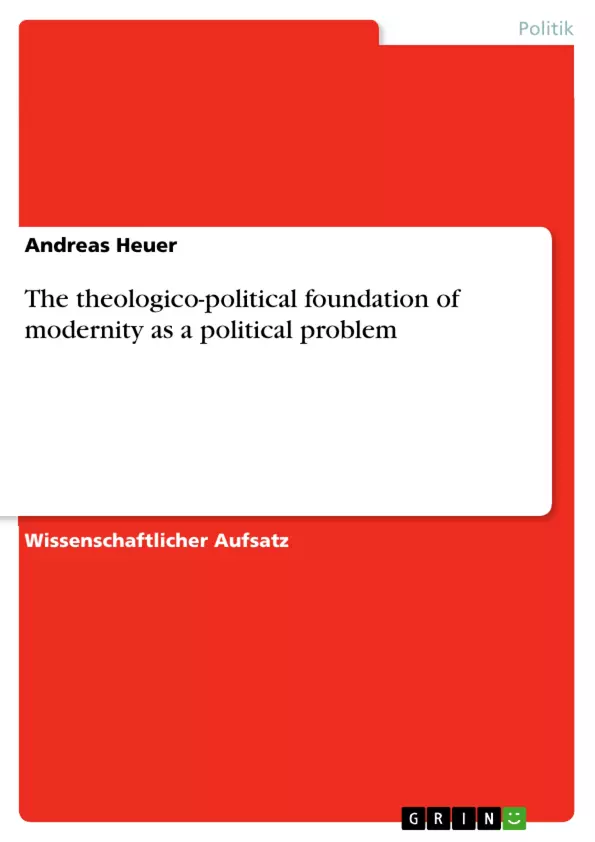In this paper I examine two main thinkers who articulated the theologico-political conflict as a major problem of politics and modern state: Leo Strauss and Carl Schmitt. Both were convinced that the liberal state has failed in its attempt to overcome this conflict; they maintain, on the contrary, that faith and religion, albeit in different ways, retain their influence on the public sphere of modern state. The monistic structure of religion, in particular, permeates the western political tradition. This monistic structure which comes from monotheistic religion heavily influenced Greek political philosophy as it was prior to its foundation. Astours notes that “long before Hellenism imposed itself over the ancient civilization of the East, Semitism had exercised no less an impact upon the young civilization of Greece. Hellenism became the epilogue of Oriental civilizations, but Semitism was the prologue of Greek civilization”.
Firstly, I will examine Strauss concept of political philosophy because it brings this conflict into light. Through the distinction between natural law and natural right, Strauss is able to demonstrate how the conflict between politics and religion is at the core of Western political thinking. In following his approach of putting into question the modern concept of natural right, I want to rediscover the basis of the conflict between politics and religion in Western tradition.
Secondly, I will question Schmitt’s concept of political theology. Schmitt argues that all significant concepts on modern theory of the state are secularized theological concepts. With Schmitt we may better understand the context of ethical-political monotheism in its secularized version a concept that is too often used by the peoples of the developing world to legitimize their political actions towards “developing countries”.
Thirdly, I will present the background of political thinking in East Asia. Here we find a concept of politics which did not develop in the framework of a monotheistic religion. Nonetheless, cosmology plays an important part in its political philosophy, the notion of heaven leads to a more open foundation of a political community where religions are part of such a community without creating a sharp contrast between politics and religion(s).
Inhaltsverzeichnis (Table of Contents)
- Introduction
- 1. Leo Strauss und das Theologico-Politische Problem
- 2. Carl Schmitt: Das Konzept der Politischen Theologie
- 3. Der Hintergrund des Politischen Denkens in Ostasien
- Schlussfolgerungen
Zielsetzung und Themenschwerpunkte (Objectives and Key Themes)
Dieser Text analysiert die theologisch-politische Grundlage der Moderne als politisches Problem, indem er die Ansichten von Leo Strauss und Carl Schmitt beleuchtet. Er untersucht, wie die Trennung von Politik und Religion in der westlichen Tradition den Konflikt zwischen diesen Bereichen hervorgehoben hat und wie die säkularisierte Version des ethisch-politischen Monotheismus verwendet wird, um politische Aktionen gegenüber „Entwicklungsländern“ zu rechtfertigen. Darüber hinaus wird der politische Hintergrund in Ostasien beleuchtet, der zeigt, dass die Trennung von Politik und Religion nicht universell ist.
- Die theologisch-politische Problematik in der westlichen Tradition
- Die Rolle der Religion in der modernen Staatsphilosophie
- Der Einfluss des Monotheismus auf das politische Denken
- Die Besonderheiten des politischen Denkens in Ostasien
- Der Aufstieg neuer Modernitäten und das Konzept eines multipolaren Weltordnungs
Zusammenfassung der Kapitel (Chapter Summaries)
- Introduction: Der Text stellt die aktuelle Debatte über die Entstehung eines multipolaren Weltordnungs vor und argumentiert, dass die zugrundeliegenden Annahmen über die Beziehung zwischen Politik und Religion neu überdacht werden müssen.
- 1. Leo Strauss und das Theologico-Politische Problem: Dieses Kapitel analysiert Strauss' Konzept der politischen Philosophie, welches die Unterscheidung zwischen Naturrecht und Naturgesetz als Kernpunkt des Konflikts zwischen Politik und Religion identifiziert.
- 2. Carl Schmitt: Das Konzept der Politischen Theologie: Schmitts Argument, dass alle wichtigen Konzepte der modernen Staatsphilosophie säkularisierte theologische Konzepte sind, wird in diesem Kapitel erläutert.
- 3. Der Hintergrund des Politischen Denkens in Ostasien: Dieses Kapitel stellt dar, wie die politische Philosophie in Ostasien im Kontext einer nicht-monotheistischen Religion entstanden ist, wobei die Kosmologie und der Himmel eine zentrale Rolle spielen.
Schlüsselwörter (Keywords)
Die Schlüsselwörter des Textes sind: theologisch-politisches Problem, Leo Strauss, Carl Schmitt, Politische Theologie, Moderne, Staatsphilosophie, Religion, Politik, Monotheismus, Ostasien, Kosmologie, Multipolarität, neue Modernitäten.
Häufig gestellte Fragen
Was ist das „theologisch-politische Problem“ laut Leo Strauss?
Strauss identifiziert den Konflikt zwischen Naturrecht und religiösem Gesetz als Kernpunkt der westlichen politischen Philosophie und hinterfragt den Versuch der Moderne, diesen zu überwinden.
Was besagt Carl Schmitts Konzept der Politischen Theologie?
Schmitt argumentiert, dass alle prägnanten Begriffe der modernen Staatslehre säkularisierte theologische Begriffe sind (z.B. der Souverän als Analogon zu Gott).
Wie unterscheidet sich das politische Denken in Ostasien von dem im Westen?
In Ostasien entwickelte sich Politik oft ohne monotheistischen Rahmen. Stattdessen spielt die Kosmologie (Himmel) eine zentrale Rolle, was zu einer offeneren Integration von Religionen führt.
Warum ist der monistische Charakter von Religionen politisch bedeutsam?
Die monistische Struktur monotheistischer Religionen beeinflusst die westliche Tradition stark und prägt staatliche Machtansprüche sowie die öffentliche Sphäre.
Was bedeutet Multipolarität in diesem Kontext?
Es beschreibt den Aufstieg neuer Modernitäten außerhalb des westlichen Modells, was eine Neubewertung der Beziehung zwischen Politik und Religion weltweit erforderlich macht.
- Quote paper
- Dr. phil. Andreas Heuer (Author), 2011, The theologico-political foundation of modernity as a political problem, Munich, GRIN Verlag, https://www.grin.com/document/172910



